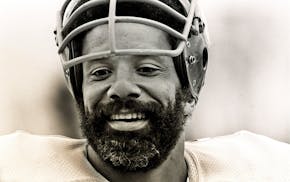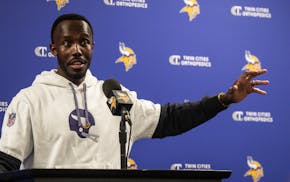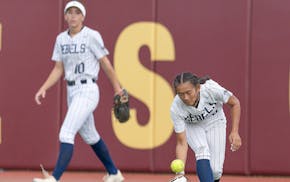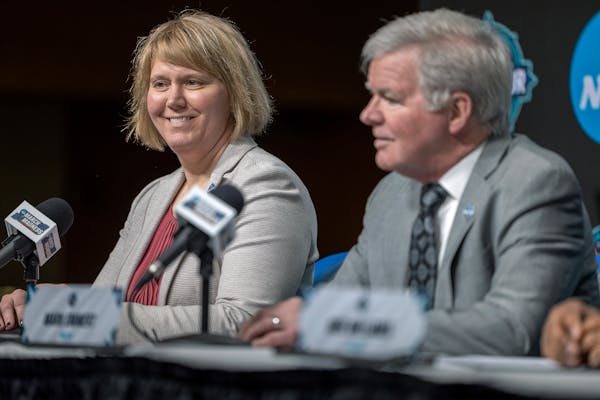NCAA President Mark Emmert, speaking Wednesday in advance of the women's Final Four basketball weekend at Target Center, addressed transgender participation in women's sports, saying the NCAA is looking to phase in standards similar to those employed by the Olympics.
The NCAA is "committed to using the same standards as the Olympics and simply phasing" them in for transgender athletes, Emmert said Wednesday. The Olympic standards direct each sport to develop its own rules, moving away from testosterone-based limits toward a system that doesn't presume transgender women have an advantage.
The issue has resurfaced for the NCAA this year because of the impressive performances of University of Pennsylvania swimmer Lia Thomas. She won the 500-yard freestyle at women's nationals two weeks ago, becoming the first known transgender athlete to win a Division I championship.
Thomas' swimming has, among other cases, pushed the eligibility discussion about trans athletes into statehouses and Congress. One side says the integrity of women's sports demands that only those born female compete as women and girls. The other says fears of transwomen dominating events are overblown, mean-spirited and a cover for violations of Title IX, the 50-year-old law that protects students from gender discrimination at schools receiving federal funding.
Minnesota Family Council CEO John Helmberger said his conservative nonprofit is promoting legislation that allows athletes to compete based strictly on what he called biological sex.
"This is the best way to ensure that Minnesota's young athletes, especially girls and women, can earn medals, championships and scholarship spots without worrying about competing against athletes who have unfair physical advantages," he said.
Erin Maye Quade, advocacy director at the nonprofit Gender Justice and a former DFL legislator, said concerns about trans athletes are contrived.
"We've had trans inclusion in Minnesota since 2014, almost 10 years," she said. "It's just not a problem."
In 2014, the Minnesota State High School League (MSHSL) overwhelmingly approved a policy allowing transgender students to participate in girls' sports. State law already allowed girls to participate in boys' sports, exempting only religiously affiliated private schools. An MSHSL spokesman couldn't say how many transgender athletes participate in league schools across the state.
The issue is far from settled on the national and international levels. Several states have worked quickly to pass bans on trans athletes.
Earlier this year, South Dakota and Iowa, both states with Republican governors, banned transgender women and girls from competing in female sports at all levels. Utah became the 12th state to pass such a ban this month after lawmakers there overrode the Republican governor's veto of the move.
At the Minnesota Capitol, similar proposals to ban trans athletes have had little traction.
"All of these states that are banning trans inclusion are going to see lawsuits," Maye Quade said. "And [the lawsuits] are going to be successful."
Recent Minnesota court rulings suggest she is right. In September 2020, the Court of Appeals ruled that a transgender Coon Rapids High School swimmer had a right to use the boys' locker room. The court concluded that "requiring a transgender student to use a different locker-room facility because of his sexual orientation is discrimination." The boy's mother sued, and the student won a $300,000 settlement.
In a remarkably similar settlement last summer, a transgender student in the Buffalo-Hanover-Montrose school district won restroom access and $218,500 from the district.
But Maye Quade said discussions about banning trans athletes are occurring in a more subtle, "Minnesota Nice" way.
"We have seen the same LGBTQ hate groups doing work in Minnesota that they're doing in other states," she said.
Maye Quade noted a recent meeting of the Becker Public Schools where the Mankato-based Child Protection League was invited to speak. Betsy Armstrong, a former Becker school board member, spoke about the "worrisome" increase in the number of transgender youth and referenced a Bible quote that says God created two sexes, male and female.
Maye Quade dismissed concerns that trans women and girls will dominate female sports because of physical advantages.
"There is no one thing that makes somebody good or bad at sports," she said.
Chris Voelz, the University of Minnesota's women's athletic director from 1988 to 2002, also was dismissive of that argument. She said only 2% of trans people participate in sports.
"This whole narrative being pushed about men taking over women's sports is a red herring," Voelz said, adding that trans athletes "are not doing this to win medals. They are doing this because they don't fit in their body and they want to play sports."
Staff writer Patrick Reusse contributed to this report.

Reusse: Marshall never lost his lust for life

Twins open homestand with loss to Blue Jays, Jeffers ejected after critical call

Vikings GM talks to the Star Tribune about the team's 2025 outlook, McCarthy's trajectory

Champlin Park turns a big moment into the Class 4A softball championship

